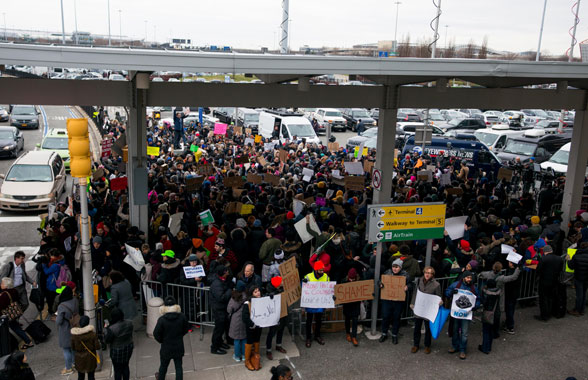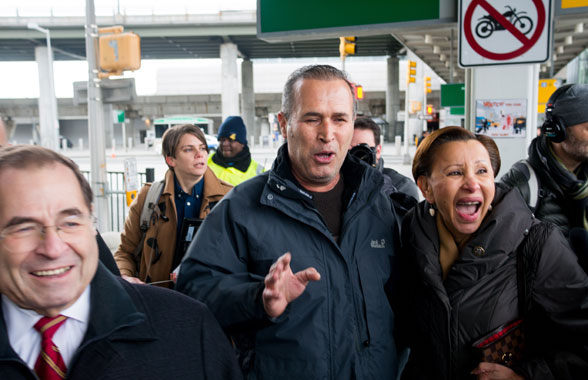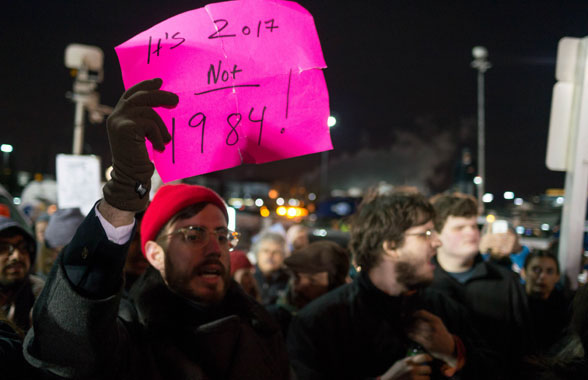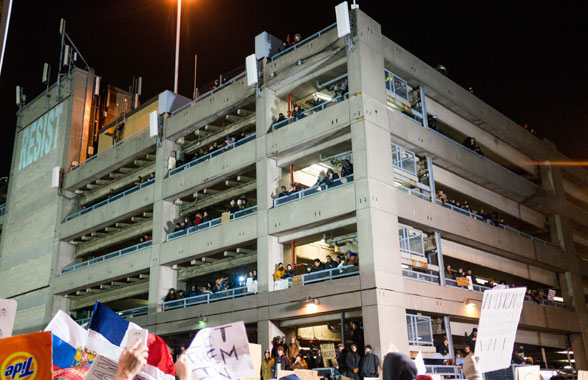
BY NAEISHA ROSE | More than 1,000 demonstrators converged on Kennedy Airport on Sat., Jan. 28, after President Donald Trump banned Muslims from seven countries from entering the United States for 90 days.
In less than one day, Muslim citizens from Iran, Iraq, Libya, Somalia, Sudan, Syria, and Yemen were stopped at Kennedy and other airports around the country. Noticeably absent from the list were people from Egypt, the United Arab Emirates, and Saudi Arabia — the three Muslim-majority states that have business ties with the president, Reuters reported.
Trump’s executive order allowed Christian minorities from those countries to enter the United States. Entry was denied to refugees from all countries for 120 days.
Later in the evening a Brooklyn federal judge issued a temporary stay, reversing the order.
Trump’s ban resulted in at least a dozen people with valid visas being detained at JFK, including Iraqi translator Hameed Khalid Darweesh, who risked his life to assist the US Army. He was freed after several hours of detention.

One soldier from Connecticut came to protest outside Terminal 4 in support of the translator and the others who were stopped apprehended. “I served in Desert Storm back in the early ’90s and this isn’t the country that I served in Desert Storm for,” said Greg Schulte, 49. “They risked a lot more in [their] lives than anybody in the Trump family ever did theirs.”
He added, ”I have a problem with his blatant disregard for the people whose lives are in his hands, and that he thinks that he’s an expert in everything… it’s scary on many levels.”
The crowds grew during the day as people from around the tri-state area rushed to the airport to express their anger at the ban on people entering the United States, including those who are permanent residents holding green cards.
Peter Wagoner, a Catholic from Williamsburg, was disappointed by Trump’s affront on religion.
“I’m here because America was founded by immigrants, particularly people who are the most vulnerable,” said Wagoner, 29. “Christ tells us to help people who are being marginalized by society and hurt… They are the least likely to be a dangerous to us and we are oppressing them the most.”

Helping to bring order to the protests was Carlos Gesus Calzadilla, 19, a freshman at Long Island University in Brooklyn and the president of the Young Progressives of America.
“This here right now is one of the most important movements and protests in my lifetime, and the lifetime of anyone who has lived in the United States,” said Calzadilla, a native of Miami. “Trump is cracking down on the freedom of press, on free speech, and now he is banning a religion, which has never happened in American history before and we will not let that happen.”
NOTE: This is a reposting of Jan. 28 web content from our sister publication, the Times Ledger. The link in the above article takes readers to reporting from Ruth Brown and Lauren Gill (of our sister publication, the Brooklyn Paper).

































